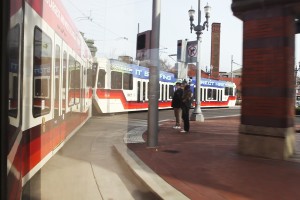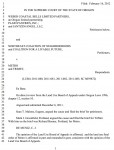Despite being decried as an inefficient, multi-billion-dollar mess by a rapidly-increasing number of people, the Columbia River Crossing Light Rail tolling project is a “political necessity” to force light rail into the area, according to an Oregon Supreme Court decision.
Suit was filed by the Northeast Coalition of Neighborhoods and Coalition for a Livable Future, protesting the Land Use Board of Appeals ruling. The suit argued that Metro either exceeded its authority in adopting the order or that its decisions were not supported by substantial evidence.

Chief Justice Paul De Muniz writes it was “politically impossible for the light rail project to proceed” without building a new I-5 bridge.
The high court affirmed the land use final order, but Chief Justice Paul De Muniz, writing for the majority, pointed out that it was “politically impossible for the light rail project to proceed without also building new interstate bridges across the Columbia River.”
In an article in Willamette Week, Plaid Pantry attorney Mike Lilly is quoted as saying the community is “stuck paying for a huge highway bridge and interchanges as an inducement to get Vancouver to accept light rail.”
The suit argued that Metro exceeded its statutory authority because it was not given “unbridled discretion” over what highway improvements may be included in the South North MAX Light Rail Project under the 1996 act.
The high court responded that Metro found that other highway improvements were necessary either because of the new bridges or because of the light rail itself. “Thus, even if petitioners are correct that the 1996 act permits only those highway improvements that are necessary to the light rail siting, that necessity exists for all the highway improvements described in Metro’s land use final order,” the ruling held.
“Washington State approval is necessary because the project extends into Vancouver, but the voters of Clark County, Washington, rejected at the ballot box a light-rail-only bridge across the Columbia,” De Muniz wrote. “As Metro explained, ‘(it) was clear from this action that a stand-alone light rail project was not politically acceptable to the voters of Clark County’.”
COUV.COM first reported on the Oregon Supreme Court’s ruling earlier this month. At that time Chris Girard, Plaid Pantry CEO and sponsor of the Cortright Report, explained that his group was part of an appeal that was heard by the Land Use Board of Appeals (LUBA). “We appealed to LUBA, and chose not to go to the Supreme Court. The parts that we lost on at LUBA would have been a stretch.”
In October 2011, the Land Use Board of Appeals did validate most of Metro’s decisions, but the board sent one item back to Metro – an urban growth boundary issue that to be resolved at the local level between Metro and TriMet.
“LUBA did agree with one of our claims,” said Girard, “That Metro doesn’t have the authority to approve a bridge out into the river. As it stands right now Metro either has to revise the urban growth boundary or change their plan and get approval for the construction that goes out into the river.”










